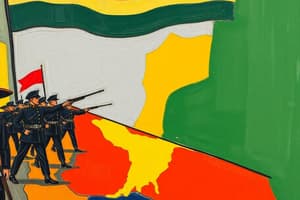Podcast
Questions and Answers
What was the main motivation behind European powers' competition for colonies and resources?
What was the main motivation behind European powers' competition for colonies and resources?
- Protection of Christian values in Africa
- Desire for prestige and expansion (correct)
- Need for self-defense against other European powers
- Fear of communism and socialism
What was the result of the arms race and buildup of military forces among European powers?
What was the result of the arms race and buildup of military forces among European powers?
- An increase in military power and glorification of war (correct)
- A decrease in military spending and disarmament
- A balance of power and stability in Europe
- The development of new military strategies and tactics
What was the main purpose of the alliances system in Europe before WW1?
What was the main purpose of the alliances system in Europe before WW1?
- To divide Europe into two opposing camps (correct)
- To balance power and prevent war
- To promote economic cooperation and trade
- To promote peace and stability in Europe
What was the immediate cause of Austria-Hungary's declaration of war on Serbia?
What was the immediate cause of Austria-Hungary's declaration of war on Serbia?
What was the main goal of the Black Hand, a secret society of Bosnian Serbs?
What was the main goal of the Black Hand, a secret society of Bosnian Serbs?
What was the main provision of Article 231 of the Treaty of Versailles?
What was the main provision of Article 231 of the Treaty of Versailles?
What was the main consequence of the war guilt clause and reparations imposed on Germany?
What was the main consequence of the war guilt clause and reparations imposed on Germany?
Why did the Treaty of Versailles impose massive reparations on Germany?
Why did the Treaty of Versailles impose massive reparations on Germany?
What was the result of the reparations imposed on Germany?
What was the result of the reparations imposed on Germany?
How did many Germans view the Treaty of Versailles?
How did many Germans view the Treaty of Versailles?
Flashcards are hidden until you start studying
Study Notes
Causes of WW1
Imperialism
- Competition for colonies and resources among European powers
- Nationalism and desire for expansion and prestige
- Examples: Scramble for Africa, Berlin Conference (1884-85)
Militarism
- Arms race and buildup of military forces among European powers
- Glorification of war and military power
- Examples: Naval buildup of Germany and Britain, French and Russian military expansion
Alliances
- System of alliances that divided Europe into two opposing camps:
- Triple Entente: France, Britain, Russia
- Triple Alliance: Germany, Austria-Hungary, Italy
- Alliances created a complex system of obligations and commitments that led to escalation of conflicts
Outbreak of WW1
Assassination of Archduke Franz Ferdinand
- June 28, 1914: Archduke Franz Ferdinand, heir to the Austro-Hungarian throne, assassinated in Sarajevo, Bosnia
- Assassination carried out by Gavrilo Princip, member of the Black Hand, a Serbian nationalist group
The Black Hand
- Secret society of Bosnian Serbs seeking independence from Austria-Hungary
- Wanted to unite Bosnia and Herzegovina with Serbia
Austria-Hungary's Response
- Austria-Hungary issued an ultimatum to Serbia, which Serbia refused to comply with
- Austria-Hungary declared war on Serbia, leading to Russia's mobilization and subsequent involvement of other European powers
Treaty of Versailles
War Guilt Clause
- Article 231 of the Treaty of Versailles, which held Germany solely responsible for the war and its damages
- Led to widespread resentment and anger among Germans, contributing to the rise of Nazi Party
Reparations
- Germany forced to pay massive reparations to Allied Powers, which contributed to economic hardship and hyperinflation in Germany
- Reparations were seen as unfair and punitive by many Germans, leading to resentment and a sense of injustice
Causes of WW1
- European powers competed for colonies and resources, fueling nationalism and a desire for expansion and prestige.
- The Scramble for Africa and the Berlin Conference (1884-85) exemplified this competition.
- An arms race and glorification of war led to a buildup of military forces among European powers.
- Examples of this militarism include the naval buildup of Germany and Britain, and the military expansion of France and Russia.
- The system of alliances in Europe divided the continent into two opposing camps: the Triple Entente (France, Britain, and Russia) and the Triple Alliance (Germany, Austria-Hungary, and Italy).
Outbreak of WW1
- On June 28, 1914, Archduke Franz Ferdinand, heir to the Austro-Hungarian throne, was assassinated in Sarajevo, Bosnia by Gavrilo Princip, a member of the Black Hand.
- The Black Hand was a secret society of Bosnian Serbs seeking independence from Austria-Hungary and unification with Serbia.
- Austria-Hungary responded to the assassination by issuing an ultimatum to Serbia, which Serbia refused to comply with.
- This led to Austria-Hungary declaring war on Serbia, which in turn led to Russia's mobilization and the involvement of other European powers.
Treaty of Versailles
- The War Guilt Clause (Article 231) held Germany solely responsible for the war and its damages, leading to widespread resentment and anger among Germans.
- Germany was forced to pay massive reparations to the Allied Powers, contributing to economic hardship and hyperinflation in Germany.
- The reparations were seen as unfair and punitive by many Germans, leading to resentment and a sense of injustice.
Studying That Suits You
Use AI to generate personalized quizzes and flashcards to suit your learning preferences.




